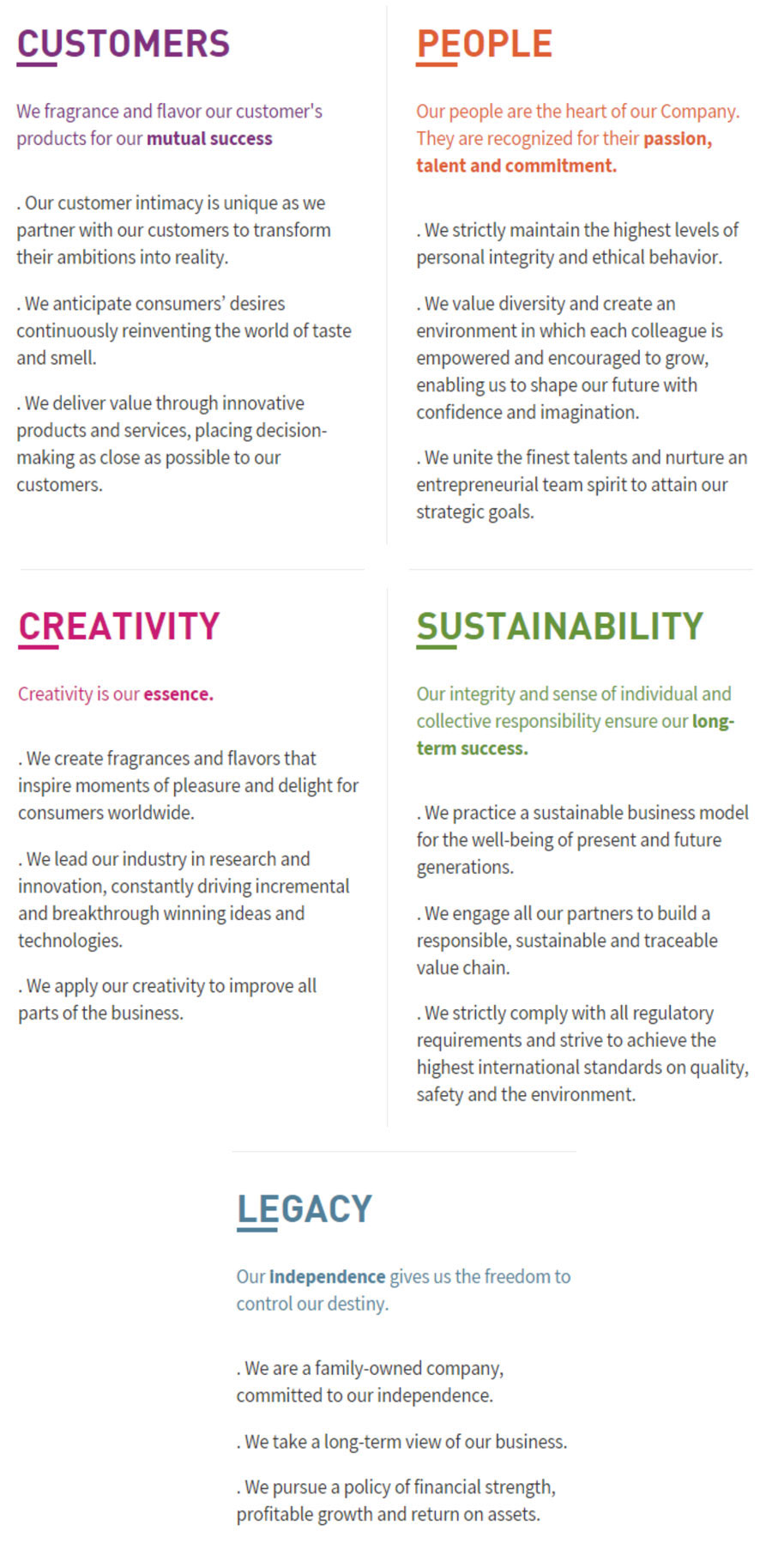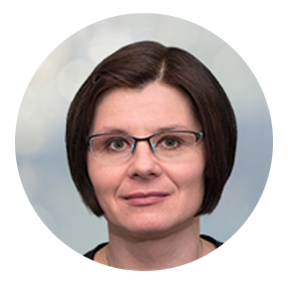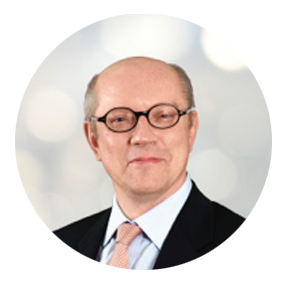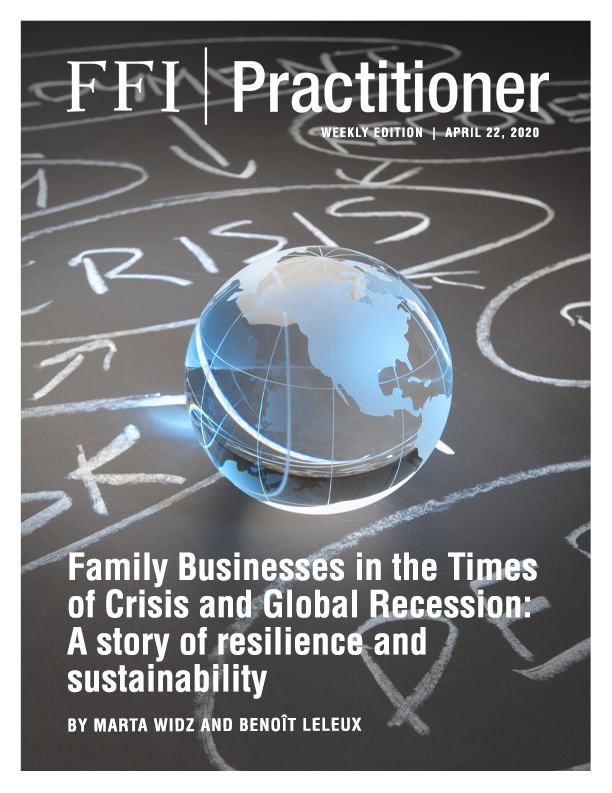Family Businesses in the Times of Crisis and Global Recession: A story of resilience and sustainability

Even though family businesses are often viewed as not the most agile, when a crisis of this magnitude hits, they are able to quickly bring to bear skills developed over generations to ensure resilience, capitalizing on the trust patiently accumulated with various stakeholders and continuing to live their deeply-held sustainability values.
For example, following a performance decrease family-owned firms are less likely to downsize the workforce.1 In the past weeks, we have seen number of multigenerational and global family businesses convert their manufacturing facilities to produce sanitizers and disinfectant solutions with the intention to donate them to the health authorities.234 One such example is Firmenich, the world’s largest privately-owned perfume and taste company.
This article, based on the Firmenich story, illustrates that at the heart of many family businesses’ successful pivot are values-based sustainability-driven business models and governance mechanisms that are resilient to even the most dramatic shocks.
Firmenich: Intertwining resilience and sustainability
Firmenich, a Geneva-based family business, is the world’s largest privately held manufacturer of fragrances and flavorings industry for consumer goods. Its client list includes the world’s largest food and beverage, beauty, and household care and fabric companies. About 4 billion people worldwide use a product containing a fragrance, flavor, or ingredient by Firmenich, ranging from yogurt or cereals in the morning to shampoo or fine fragrance at night.
– PATRICK FIRMENICH, CHAIRMAN OF THE BOARD, FIRMENICH
Established in 1895, Firmenich is currently entirely owned by family shareholders from the third to the fifth generation. The company is present in more than100 markets worldwide and operates over 80 facilities across the globe.
In response to the COVID-19 virus, Firmenich reacted swiftly and adapted the production of its Geneva manufacturing sites to donate 20 tons of disinfectant solution to the Geneva University Hospital and medical and emergency services.5 To meet increasing global demand, the Group increased its production capacity to 100 tons for hospitals, as well as medical and emergency services across the USA and Switzerland.6

“As a responsible company, it is critical for us to take action and demonstrate our solidarity with the local communities where we operate in these unprecedented times,” commented Patrick Firmenich, Chairman of the Board, Firmenich. “This hand sanitizer allows us to protect our people and the frontline emergency staff working relentlessly to combat this pandemic. Together, we will prove that solidarity is more contagious than the virus.”
What enabled the quick reaction of Firmenich was, on the one hand, its recognition of the societal value reflected in its purpose and fundamentals as well as an inclusive capitalism business model, and, on the other hand, a remarkably resilient-to-shocks governance mechanisms model of concentrated family ownership, independence, financial prudence, long-term thinking, and skilful balancing the business and owners’ needs.
Purpose and Fundamentals
Firmenich’s Purpose Statement, “For Good, Naturally,” is its north star – as a result sustainability is one of the five building blocks in Firmenich’s Fundamentals.7



Inclusive Capitalism Business Model and “Pathways to Positive” Sustainability Strategy
Firmenich has long recognized the need to capture societal values: Maximizing stakeholders’ value is Firmenich’s way to achieve the trustworthiness of employees, customers, and the wider community and is reflected in the Firmenich’s inclusive capitalism business model.
Firmenich is the first company in its industry, the first in Switzerland and the seventh worldwide to become globally certified by EDGE as Gender Equality Employer, ensuring equal pay and gender in the recruitment, promotion, and training.9 Firmenich also signed the “Valuable 500” pledge on disability inclusion and employs many blind people, who work at its sensory panels.10
Sidebar

Every year since 1996, a global leading family business has been honored with the IMD Global Family Business Award, sponsored by Pictet.
Help us celebrate the important role family businesses play in the global economy;
nominate an outstanding Global Family Business for the 2020 Award or contact them ask them to self-nominate by April 30th.
Sustainability strategy “Pathways to Positive”11 is ensured through the governance structures that support sustainability, such as Global Ethics Committee, Human Rights Committee, Biodiversity Committee, and Global Sustainability Team. The main goals are “Improving Lives Through Innovation” (the example of which is the engagement in strong innovation on new sanitation to tackle the problem of lack of access to toilets of about 4.5 billion people worldwide in a partnership with the Bill & Melinda Gates Foundation) and “Leading in Environmental Management” (the example of which is are biodegradable perfumery molecules or the boldest environmental goals in the industry to operate with 100% renewable electricity).
Resilient-to-Shocks Governance Mechanisms
Concentrated family ownership, bound by common time-proven values, gives Firmenich the ability for quick maneuvers in times of crises. Decisions can be taken quickly and shareholders are aligned behind the Firmenich’s purpose and fundamentals.
Family ownership is also the guardian for Firmenich’s vision to stay independent as “Our independence gives us the freedom to control our destiny.” That independence is also based on the family legacy, which dictates the utmost financial prudence: “We pursue a policy of financial strength, profitable growth and return on assets.”
Like many other family businesses, Firmenich is committed to long-term thinking. “We practice a sustainable business model for the well-being of present and future generations.” What for non-family businesses is long-term, is for Firmenich just an eyeblink. The company thinks in decades.
The resilient-to-shocks governance mechanisms ensure the skillful balance of business and owners’ needs, guided by the business-comes-first principle. Governance at Firmenich is based on a meritocracy principle– several family members are engaged across the business but currently, there are no family members in the top executive positions. The Board of Directors steers the company, led by a family-Chairman and has nine members, with four family directors making the minority at the board. After the long history of a chain of family CEOs, in 2014 Gilbert Ghostine was appointed the first non-family CEO. “We maximize the advantages of both the family ownership and the learnings of the publicly-traded company” stressed Gilbert Ghostine, CEO Firmenich , “all our competitors are publicly traded.”
“WE MAXIMIZE THE ADVANTAGES OF BOTH THE FAMILY OWNERSHIP AND THE LEARNINGS OF THE PUBLICLY-TRADED COMPANY. ALL OUR COMPETITORS ARE PUBLICLY TRADED.”
– GILBERT GHOSTINE, CEO, FIRMENICH
Lessons to be Learned from Family Businesses for the Post-COVID-19 World
In its long history, Firmenich has successfully navigated numerous crises (such as previous pandemics, economic depressions, and world wars). That history has taught Firmenich that resilience (e.g., governance mechanisms of concentrated family ownership, independence, financial prudence, long-term thinking, and skilful balancing the business and owners’ needs) and sustainability are the best recipes for longevity and the ability to survive the external shocks.
To thrive in the post-COVID-19 world, companies will need to develop both resilience and sustainability to ensure business continuity, liquidity, and the alignment of short- and long-term goals. No surprise, those are characteristics often associated with those family businesses we love to celebrate. They will shine brightest again during this crisis time. And the lessons should not be lost on other businesses…
…..
Firmenich was the winner of the IMD Global Family Business Award in 2011 and received the inaugural IMD-Pictet Sustainability in Family Business Award in 2019. Firmenich and will celebrate its 125th anniversary in 2020.
References
1Block, J. (2010). Family management, family ownership, and downsizing: Evidence from S&P 500 firms. Family Business Review, 23(2), 109-130.
2https://www.firmenich.com/en_INT/company/news/A-Message-from-our-CEO-on-Coronavirus-COVID-19.html
4https://www.bbc.com/news/business-51868756
7Sustainability for Firmenich means “our integrity and sense of individual and collective responsibility ensure our long-term success.” https://www.firmenich.com/en_INT/company.html
8https://www.firmenich.com/en_INT/company.html
9https://www.firmenich.com/en_INT/company/news/Certified-Equal-Pay.html
11https://www.firmenich.com/uploads/files/Firmenich_Sustainability_Report_2019.pdf

Marta Widz is a Research Fellow of IMD Global Family Business Award, sponsored by Pictet and IMD-Pictet Sustainability in Family Business Award. She serves as a non-voting jury member for both awards, heads the Evaluation Committees, and is co-chair of the FFI 2020 Conference Program Committee. She obtained her PhD at the Center for Family Business at the University of St. Gallen, Switzerland. She is a specialist in corporate, ownership and family governance, and entrepreneurship in family business. Marta can be reached at marta.widz@imd.org.

About the Contributors


Can’t make Mondays? Join Family Business Australia for its Wednesday webinar series.
